|
|
|
Sort Order |
|
|
|
Items / Page
|
|
|
|
|
|
|
| Srl | Item |
| 1 |
ID:
142278
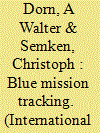

|
|
|
|
|
| Summary/Abstract |
A basic but as yet unachieved goal for UN missions is to know the exact locations of their peacekeepers at any given time. Such tracking would help field missions plan operations, avoid and respond to ambushes, kidnappings and friendly fire incidents, rapidly send reinforcements and retrieve wounded peacekeepers, ultimately saving lives. Improved effectiveness could be obtained from ‘precision peacekeeping’, where soldiers, police and civilians are deployed to precise locations and events, while operational leaders follow their movements. Fortunately, tracking technology has improved considerably so that commercial solutions for real-time tracking of personnel and vehicles are now available at lower cost and increased accuracy and sophistication, while being more user-friendly. The advances in phone and vehicle tracking systems are reviewed here to identify the benefits, drawbacks and challenges, especially any political ones, for the United Nations. The world organization can benefit from modern blue mission tracking, without having to develop costly, customized solutions. Such initiatives have few technological or financial hurdles but the politics and institutionalization of continuous positional surveillance needs policy modernization, guided by a nuanced understanding of technological empowerment.
|
|
|
|
|
|
|
|
|
|
|
|
|
|
|
|
| 2 |
ID:
142273
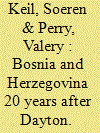

|
|
|
|
|
| Summary/Abstract |
It has been 20 years since the Dayton Peace Agreement (DPA, official name: General Framework Agreement for Peace in Bosnia and Herzegovina) ended the bloodiest war in Europe since World War II. The violent conflict and the peace agreement demonstrated many of the tectonic changes that Europe and the world as a whole went through after the end of the Cold War. First, the wars highlighted the inability of the European Community (after 1993 European Union (EU)) to end the conflict, because of its Member States' disagreement on strategies and options, including the threat of military intervention, and the brilliant recognition and manipulation of this wavering by Balkan leaders. Reflecting this European discord, the DPA secondly highlighted the importance of the United States as the only remaining superpower capable of decisively intervening to end the violence in Southeastern Europe. The perception of a weak EU and a strong US willing to use military force would be further strengthened when NATO, significantly led by the US, intervened in the Kosovo war in 1999. Third, the war, and the consequent peace agreement also highlighted that the end of the Cold War by no means resulted in an end of violent conflict in Europe and beyond. Francis Fukuyama's thesis of the “End of History” and the victory of capitalism and democracy proved to be wrong, shortly after it was formulated. Finally, the war in Bosnia and the resulting peace agreement raised new discussions about the drivers of political violence and conflict, the role of ethnicity in democratic systems and institutional options available to overcome such wars and build and consolidate democracies.
|
|
|
|
|
|
|
|
|
|
|
|
|
|
|
|
| 3 |
ID:
142274
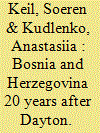

|
|
|
|
|
| Summary/Abstract |
This article will start with an analysis of the Dayton Peace Agreement, and assess to what extent it focused on peace-building, state-reconstruction and democratization. It will provide an overview of major peace-building, state-reconstruction and democratization initiatives by international and local actors in post-war Bosnia. Following the often-presented argument that ‘Dayton is a good peace agreement but a bad blueprint for a democratic state’, the article will ask if the Dayton Peace Agreement has failed in the consolidation of Bosnian statehood and the democratization of the country. In order to do this, an in-depth analysis of the current situation in terms of state consolidation and democratization will be given. The main argument of the article demonstrates that while the Dayton Agreement had some inherent weaknesses, actions by local elites and international state-builders also explain some of the current issues of the Bosnian state.
|
|
|
|
|
|
|
|
|
|
|
|
|
|
|
|
| 4 |
ID:
142275
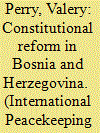

|
|
|
|
|
| Summary/Abstract |
This article considers Bosnia and Herzegovina (BiH)'s constitutional reform path options following the 20-year anniversary of the Dayton Agreement that ended the war. The need for substantive structural and constitutional reform has not gone away, and there is an open question on whether and how Euro-Atlantic integration processes might influence reform outcomes. First, a brief review of constitutional reform efforts to date is presented. Second, arguments for and against constitutional reform in BiH are summarized. Next, some characteristics of federal and confederal systems are introduced to frame discussions on BiH decision-making capabilities, and the role of the state vs lower levels of government. This includes a discussion on the issue of a BiH ‘coordination mechanism’ to manage EU integration, and whether or not the state might need some sort of supremacy clause. The article closes with some musings on the apparent trajectory of the country. The case of BiH is not sui generis, and can contribute to the literature and potentially influence policy-makers interested in the implementation and possible re-negotiation of peace treaties and constitutions – issues relevant to any countries emerging from divisive, violent conflict.
|
|
|
|
|
|
|
|
|
|
|
|
|
|
|
|
| 5 |
ID:
142280
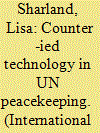

|
|
|
|
|
| Summary/Abstract |
Improvised explosive devices (IEDs) pose a significant threat to UN peacekeepers. This article argues that the UN needs to draw on the lessons from multinational engagements such as Afghanistan to identify, generate and deploy counter-IED technology to UN peacekeeping operations in a more systematic manner. It examines lessons emerging from the application of counter-IED technology in past multinational operations in order to identify areas to expand capabilities and mitigate risks in addressing the threat in the context of UN peacekeeping operations. First, it examines the evolving nature of the IED threat. Second, it surveys some of the lessons emerging from the use of technology in multinational engagements such as the NATO International Security Assistance Force in Afghanistan. Third, it explains some of the approaches already in place in UN peacekeeping operations. Fourth, it identifies potential challenges and limitations to employing more technology solutions to counter IEDs in UN peacekeeping missions, offering some thoughts on areas requiring broader reform to address the growing IED threat in UN peacekeeping missions. It concludes that technology can improve force protection, intelligence and the medical support available to peacekeeping missions to prevent and mitigate the effect of IEDs, thereby strengthening the safety and security of peacekeeping personnel, enhancing mission mobility, and improving the effectiveness of mandate implementation when it comes to the protection of civilians and early peacebuilding efforts.
|
|
|
|
|
|
|
|
|
|
|
|
|
|
|
|
| 6 |
ID:
142276
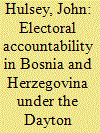

|
|
|
|
|
| Summary/Abstract |
This article examines the ways in which Bosnia's continuing governance problems are rooted in the relationship between voters and parties implied in the Dayton Accords. Political competition and the party system in Bosnia are influenced by the structure of government and electoral system in the Dayton Accords and subsequent regulations, which gives preference to a model of representation based on ethnic parties. This article examines the party system and nature of competition in order to show the weaknesses in this ethnic model of representation as well as the ongoing inability to establish alternative models such as broad multi-ethnic parties.
|
|
|
|
|
|
|
|
|
|
|
|
|
|
|
|
| 7 |
ID:
142279
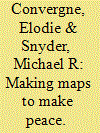

|
|
|
|
|
| Summary/Abstract |
This article analyses how United Nations peacekeeping operations are harnessing geospatial technology, including high-resolution satellite imagery and geographic information systems (GIS), in the furtherance of peace and security. We argue that it is strengthening the ability of peacekeepers to accomplish their mandated tasks, including the demarcation of international boundaries, support for the negotiation of peace agreements, stabilization, the protection of civilians, human rights monitoring, electoral assistance, support for the extension of state authority and the provision of humanitarian assistance. However, it remains to be seen how and to what extent UN peacekeeping can continue to grow and expand its geospatial capabilities. We identify several challenges of an operational and political nature that tend to impede its utilization. A key question in this regard is whether politics will prevent peacekeepers from exploiting recent advances in geospatial technology. We conclude and synthesize our argument by developing a simplified framework for determining when and under what conditions peacekeepers can effectively harness geospatial technology.
|
|
|
|
|
|
|
|
|
|
|
|
|
|
|
|
| 8 |
ID:
142277


|
|
|
|
|
| Summary/Abstract |
This article uses the lenses of citizenship to examine the uneven distribution of voting rights in Bosnia and Herzegovina (BiH). While recognizing the significance of power-sharing in BiH, the article argues that the key obstacle to modifying the politics of inclusion and exclusion through citizenship and the franchise is the static nature of political competition in the country. The intimate relationship between political parties and their ethno-centric agendas on the one hand, and the multi-tiered governance structure on the other, prevents the possibility of reaching an agreement on constitutional reform as it would disrupt the current power balances that favour ethnic elites.
|
|
|
|
|
|
|
|
|
|
|
|
|
|
|
|
|
|
|
|
|